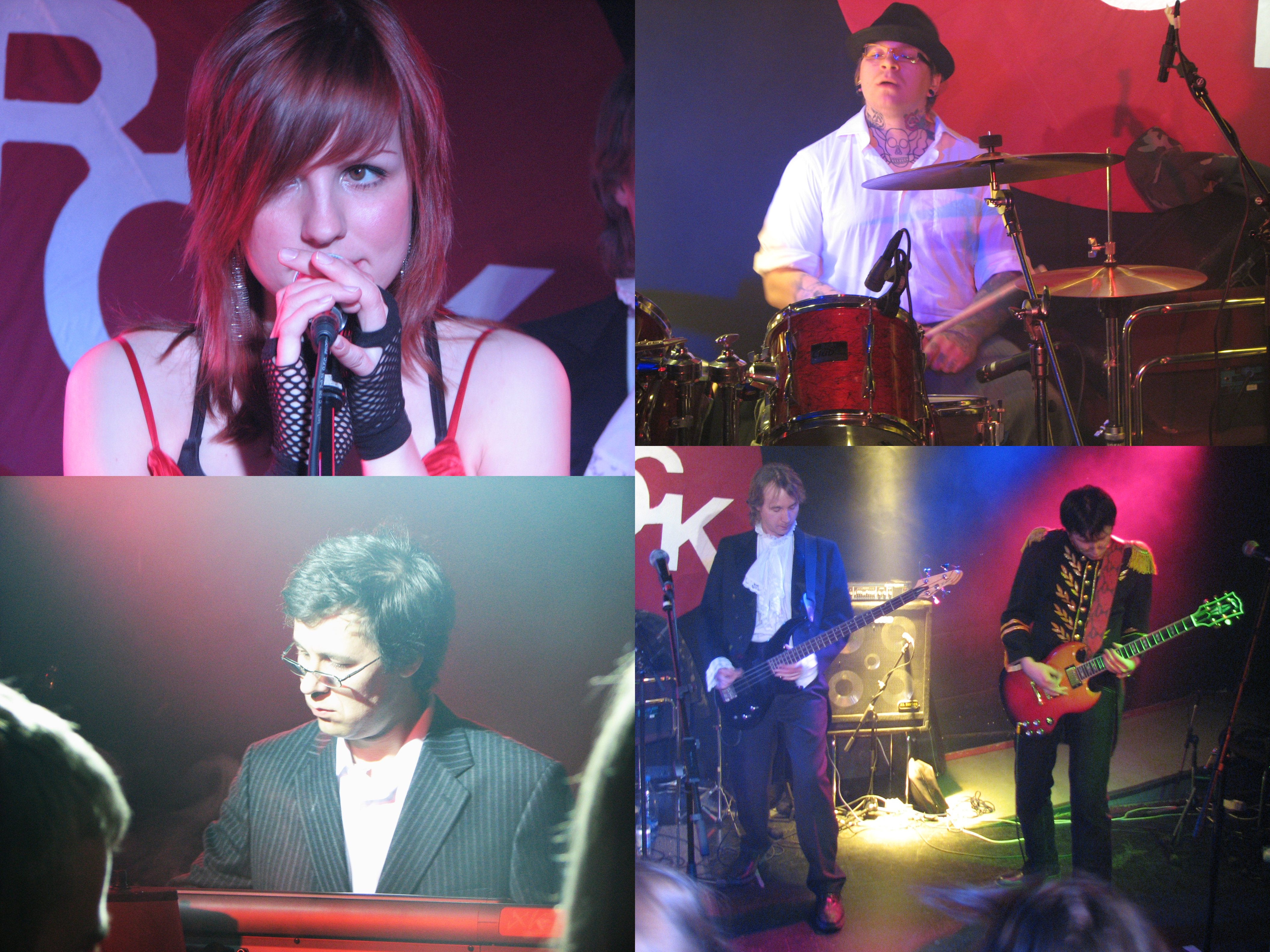|
Agent M (band)
Agent M is an Estonian alternative rock group with new wave and post-punk influences. Their songs are sung in Estonian Estonian may refer to: * Something of, from, or related to Estonia, a country in the Baltic region in northern Europe * Estonians, people from Estonia, or of Estonian descent * Estonian language * Estonian cuisine * Estonian culture See also ... and English. Agent M started as a studio project of guitarist Marten Vill and a female singer Merili Varik in late 2004. Singles "7 Surmapattu" and "Kus on mu kodu" gained attention by local radios and a full live band was formed. The band has released five videos and two of them entered the MTV Baltic playlists. In spring 2007, Agent M was announced as the winner of Baltic New Music Chart. The band released an EP "Šokolaad" (Chocolate) in 2006 and a full album ''Spionaaž'' (Espionage) in 2007. Band was disbanded in the autumn 2009. Reformation and separation In the end of September 2011, Agent M announced ... [...More Info...] [...Related Items...] OR: [Wikipedia] [Google] [Baidu] |
Harjumaa
Harju County ( et, Harju maakond or ''Harjumaa''), is one of the fifteen counties of Estonia. It is situated in Northern Estonia, on the southern coast of the Gulf of Finland, and borders Lääne-Viru County to the east, Järva County to the southeast, Rapla County to the south, and Lääne County to the southwest. The capital and largest city of Estonia, Tallinn, is situated in Harju County. Harju County is the largest county in Estonia in terms of population, as almost half (45%) of the Estonia's population lives in Harju County. History Ancient history The territory of modern Harju County consists mostly of two ancient Estonian counties: Revala, around what is now Tallinn, and Harjumaa, which was situated south of Revala and presently rests mostly in Rapla County. Lindanise, then a small trading post at the Gulf of Finland, served as the capital of Revala. It eventually grew into the mostly German-populated Hanseatic town of ''Reval'' and later into the Estonian capit ... [...More Info...] [...Related Items...] OR: [Wikipedia] [Google] [Baidu] |
Estonian Language
Estonian ( ) is a Finnic language, written in the Latin script. It is the official language of Estonia and one of the official languages of the European Union, spoken natively by about 1.1 million people; 922,000 people in Estonia and 160,000 outside Estonia. Classification Estonian belongs to the Finnic branch of the Uralic language family. The Finnic languages also include Finnish and a few minority languages spoken around the Baltic Sea and in northwestern Russia. Estonian is subclassified as a Southern Finnic language and it is the second-most-spoken language among all the Finnic languages. Alongside Finnish, Hungarian and Maltese, Estonian is one of the four official languages of the European Union that are not of an Indo-European origin. From the typological point of view, Estonian is a predominantly agglutinative language. The loss of word-final sounds is extensive, and this has made its inflectional morphology markedly more fusional, especially with respec ... [...More Info...] [...Related Items...] OR: [Wikipedia] [Google] [Baidu] |
Musical Groups Reestablished In 2011 , the ability to perceive music or to create music
*
{{Music disambiguation ...
Musical is the adjective of music. Musical may also refer to: * Musical theatre, a performance art that combines songs, spoken dialogue, acting and dance * Musical film and television, a genre of film and television that incorporates into the narrative songs sung by the characters * MusicAL, an Albanian television channel * Musical isomorphism, the canonical isomorphism between the tangent and cotangent bundles See also * Lists of musicals * Music (other) * Musica (other) * Musicality Musicality (''music-al -ity'') is "sensitivity to, knowledge of, or talent for music" or "the quality or state of being musical", and is used to refer to specific if vaguely defined qualities in pieces and/or genres of music, such as melodiousness ... [...More Info...] [...Related Items...] OR: [Wikipedia] [Google] [Baidu] |
New Wave Groups
New is an adjective referring to something recently made, discovered, or created. New or NEW may refer to: Music * New, singer of K-pop group The Boyz Albums and EPs * ''New'' (album), by Paul McCartney, 2013 * ''New'' (EP), by Regurgitator, 1995 Songs * "New" (Daya song), 2017 * "New" (Paul McCartney song), 2013 * "New" (No Doubt song), 1999 *"new", by Loona from '' Yves'', 2017 *"The New", by Interpol from ''Turn On the Bright Lights'', 2002 Acronyms * Net economic welfare, a proposed macroeconomic indicator * Net explosive weight, also known as net explosive quantity * Network of enlightened Women, a conservative university women's organization * Next Entertainment World, a South Korean film distribution company Identification codes * Nepal Bhasa language ISO 639 language code * New Century Financial Corporation (NYSE stock abbreviation) * Northeast Wrestling, a professional wrestling promotion in the northeastern United States Transport * New Orleans Lakefront Airp ... [...More Info...] [...Related Items...] OR: [Wikipedia] [Google] [Baidu] |
Estonian Rock Music Groups
Estonian may refer to: * Something of, from, or related to Estonia, a country in the Baltic region in northern Europe * Estonians, people from Estonia, or of Estonian descent * Estonian language * Estonian cuisine * Estonian culture See also * * Estonia (other) * Languages of Estonia * List of Estonians This is a list of notable Estonians. Architects *Andres Alver (born 1953) * Dmitri Bruns (1929–2020) *Karl Burman (1882–1965) *Eugen Habermann (1884–1944) *Georg Hellat (1870–1943) * Otto Pius Hippius (1826–1883) *Erich Jacoby (1885–1 ... {{Disambiguation Language and nationality disambiguation pages ... [...More Info...] [...Related Items...] OR: [Wikipedia] [Google] [Baidu] |
English Language
English is a West Germanic language of the Indo-European language family, with its earliest forms spoken by the inhabitants of early medieval England. It is named after the Angles, one of the ancient Germanic peoples that migrated to the island of Great Britain. Existing on a dialect continuum with Scots, and then closest related to the Low Saxon and Frisian languages, English is genealogically West Germanic. However, its vocabulary is also distinctively influenced by dialects of France (about 29% of Modern English words) and Latin (also about 29%), plus some grammar and a small amount of core vocabulary influenced by Old Norse (a North Germanic language). Speakers of English are called Anglophones. The earliest forms of English, collectively known as Old English, evolved from a group of West Germanic ( Ingvaeonic) dialects brought to Great Britain by Anglo-Saxon settlers in the 5th century and further mutated by Norse-speaking Viking settlers starting in ... [...More Info...] [...Related Items...] OR: [Wikipedia] [Google] [Baidu] |
Post-punk
Post-punk (originally called new musick) is a broad genre of punk music that emerged in the late 1970s as musicians departed from punk's traditional elements and raw simplicity, instead adopting a variety of avant-garde sensibilities and non-rock influences. Inspired by punk's energy and DIY ethic but determined to break from rock cliches, artists experimented with styles like funk, electronic music, jazz, and dance music; the production techniques of dub and disco; and ideas from art and politics, including critical theory, modernist art, cinema and literature. These communities produced independent record labels, visual art, multimedia performances and fanzines. The early post-punk vanguard was represented by groups including Siouxsie and the Banshees, Wire, Public Image Ltd, the Pop Group, Cabaret Voltaire, Magazine, Pere Ubu, Joy Division, Talking Heads, Devo, Gang of Four, the Slits, the Cure, and the Fall. The movement was closely related to the deve ... [...More Info...] [...Related Items...] OR: [Wikipedia] [Google] [Baidu] |
Tallinn
Tallinn () is the most populous and capital city of Estonia. Situated on a bay in north Estonia, on the shore of the Gulf of Finland of the Baltic Sea, Tallinn has a population of 437,811 (as of 2022) and administratively lies in the Harju '' maakond'' (county). Tallinn is the main financial, industrial, and cultural centre of Estonia. It is located northwest of the country's second largest city Tartu, however only south of Helsinki, Finland, also west of Saint Petersburg, Russia, north of Riga, Latvia, and east of Stockholm, Sweden. From the 13th century until the first half of the 20th century, Tallinn was known in most of the world by variants of its other historical name Reval. Tallinn received Lübeck city rights in 1248,, however the earliest evidence of human population in the area dates back nearly 5,000 years. The medieval indigenous population of what is now Tallinn and northern Estonia was one of the last " pagan" civilisations in Europe to adopt Christia ... [...More Info...] [...Related Items...] OR: [Wikipedia] [Google] [Baidu] |
New Wave Music
New wave is a loosely defined music genre that encompasses pop-oriented styles from the late 1970s and the 1980s. It was originally used as a catch-all for the various styles of music that emerged after punk rock, including punk itself. Later, critical consensus favored "new wave" as an umbrella term involving many popular music styles of the era, including power pop, synth-pop, ska revival, and more specific forms of punk rock that were less abrasive. It may also be viewed as a more accessible counterpart of post-punk. Common characteristics of new wave music include a humorous or quirky pop approach, the use of electronic sounds, and a distinctive visual style in music videos and fashion. In the early 1980s, virtually every new pop/rock act – and particularly those that employed synthesizers – were tagged as "new wave". Although new wave shares punk's do-it-yourself philosophy, the artists were more influenced by the styles of the 1950s along with the lighter stra ... [...More Info...] [...Related Items...] OR: [Wikipedia] [Google] [Baidu] |
Alternative Rock
Alternative rock (also known as alternative music, alt-rock or simply alternative) is a category of rock music that evolved from the independent music underground of the 1970s. Alternative rock acts achieved mainstream success in the 1990s with the likes of the grunge, shoegaze, and Britpop subgenres in the United States and United Kingdom, respectively. During this period, many record labels were looking for "alternatives", as many corporate rock, hard rock, and glam metal acts from the 1980s were beginning to grow stale throughout the music industry. The emergence of Generation X as a cultural force in the 1990s also contributed greatly to the rise of alternative rock. "Alternative" refers to the genre's distinction from mainstream or commercial rock or pop. The term's original meaning was broader, referring to musicians influenced by the musical style or independent, DIY ethos of late-1970s punk rock.di Perna, Alan. "Brave Noise—The History of Alternative Rock Gu ... [...More Info...] [...Related Items...] OR: [Wikipedia] [Google] [Baidu] |






